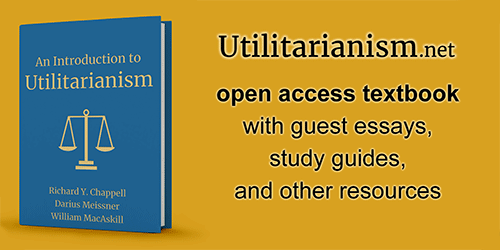Mini-Heap
The latest links…

- “Behold this table, if you can / Its parts assembled to a plan. / But parts can be, without a whole: / Try summing candy with a mole…” — “Composition as Fiction,” a poem by Brad Skow (MIT)
- “No matter how wonderful these online events can be, many of the good things that come with travelling to workshops and conferences are not part of online events” — one consideration among many taken up in a discussion by Ingrid Robeyns (Utrecht) on whether academics should fly at all
- Brief reflections on ChatGPT and its threat to academia, from a dozen philosophers — collected by Ahmed Bouzid
- “Trying to extinguish racism while shoring up race is like trying to put out a fire by pouring gasoline on it. It can only make matters worse” — Subrema Smith (New Hampshire) and David Livingstone Smith (New England) on why “to get rid of racism we have to get rid of race”
- The debate over the authorship of letters attributed to Plato — “enormous reverence for Plato” has unduly influenced it, argues James Romm (Bard)
- “Her philosophy professor is called to the witness stand and counters that it is ‘rather odd, an African woman interested in an Austrian philosopher from the early 20th century. Why not choose someone closer to her own culture?’” — Francey Russell (Barnard/Columbia) reviews a movie based on a true story that “needed to be rerouted and mediated through the alchemical powers of narrative film”
- “A guide to AI and tech in the university classroom. What works, what doesn’t, and why. Written by professors, for professors” — check out “AutomatED”, a project from philosophy PhD Graham Clay
Discussion welcome.
Mini-Heap posts usually appear when 7 or so new items accumulate in the Heap of Links, a collection of items from around the web that may be of interest to philosophers.
The Heap of Links consists partly of suggestions from readers; if you find something online that you think would be of interest to the philosophical community, please send it in for consideration for the Heap. Thanks!



Re #6: Perhaps the film’s refusal to provide a conventional ending, in the form of a verdict, reflects the director’s desire to frustrate or subvert the expectation that narratives should have a “real” conclusion. Or is that too obvious a point to have bothered mentioning? Prof. Russell’s review does a little, no doubt deliberate, frustrating of its own, declining to tell the reader what the verdict was in the real-life trial that the film “reroutes” and “mediates” through its “alchemical powers”.